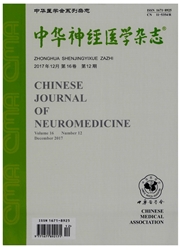

 中文摘要:
中文摘要:
目的比较丙泊酚Wada试验与功能磁共振(fMRI)在左颞叶癫痫患者术前记忆功能偏侧化预测中的-致性和敏感性。方法对广州军区广州总医院自2009年10月至2011年10月收治的8例左前颞叶切除的癫痫患者术前进行丙泊酚Wada试验和fMRI记忆功能偏侧化评估,结合韦氏记忆测验结果,比较两者记忆功能偏侧化评估的-致性与预测记忆变化的敏感性。结果lMRI词汇记忆半球、内侧颞叶功能偏侧化与Wada试验功能偏侧化判定的-致率分别为57.O%和71.4%,术后记忆商数、词汇匹配以及智力改变与fMRI词汇记忆内侧颞叶功能偏侧化指数呈显著相关(F-0-314,P=0.037;r==-0.387,P--0.013;r=0.116,P=0.020),与Wada试验功能偏侧化指数无相关性(r==-0.442,0.077;F-0.241,0.237;r==-0.070,P=-0.107)。结论丙泊酚Wada试验和fMRI记忆功能偏侧化评估-致性因感兴趣区选择方法不同而不同。相对于Wada试验,fMRI记忆功能偏侧化指数在预测患者术后词汇记忆下降的过程中敏感性更高。
 英文摘要:
英文摘要:
Objective To compare the consistency and efficiency on predicting preoperative memory lateralization of left temporal lobe epilepsy patients using propofol wada test and function magnetic resonance imaging (fMRI). Methods Eight patients with left anterior temporal lobectomy (L-ATL), were chosen in our study and performed preoperative language and memory lateralization assessment by fMRI and propofol Wada test; combined with the pre-postoperative Wechsler memory or intelligence results, the consistency and eeiency of these two methods on evaluating the memory lateralization of left temporal lobe epilepsy patients were compared. Results The concordance of medial temporal lobe lateralization and vocabulary hemispheric lateralization by fMRI was 57% and 71.4%, respectively, as compared with those results of Wada test. Preoperative fMRI memory lateralization was significantly correlated with postoperative intelligence quotient, verbal memory and memory quotient change, while the post-preoperative changes were insignificantly related to Wada LI. Conclusion The consistency is different on account of the way of selecting regions of interest between preoperative propofol Wada test and verbal memory fMRI. The sensitivity of predicting postoperative vebal memory changed by fMRI is hiher than Wada test
 同期刊论文项目
同期刊论文项目
 同项目期刊论文
同项目期刊论文
 期刊信息
期刊信息
